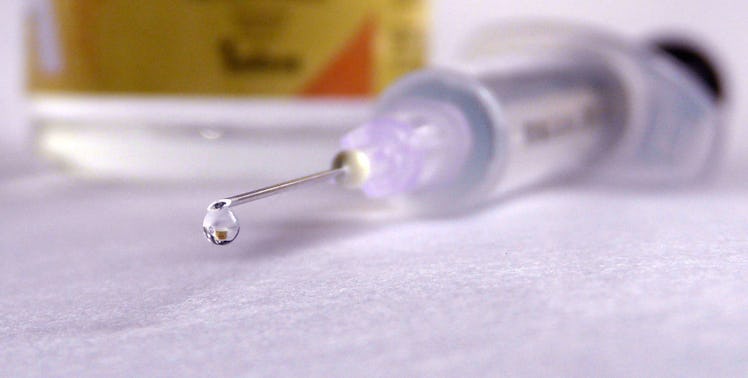What You Need To Know About Standard, High-Risk And Catch-Up Vaccination Schedules
It's a major sticking point with parents.

It’s hard to find anyone that actively enjoys needles. Maybe piercing enthusiasts? Or tattoo junkies? Either way, your baby is neither of those things. That is, unless Dennis Rodman is your nanny (what else is he going to do between visits to North Korea?).
So it’s no wonder many already primed parents want to avoid the vaccination needle. Sprinkle that hesitancy with the belief that vaccines could be harmful to your kid and you’re apt to see widespread vaccine avoidance. You’re also apt to see disease outbreaks, which tellingly have never affected Rodman.
There’s is always a lot of fervor over vaccine denial — but if you trust your kid’s pediatrician (and the AAP, and the CDC, and the WHO) getting immunized is necessary. Some parents opt for a middle option — a delayed vaccine schedule they think may be safer. But what are the risks? And if you change your mind, how do you get back on track? Here is the all the science-backed research to answer these prickly questions.
The Current Vaccine Schedule
The way the current schedule works, your baby should start getting a slate of vaccinations every 2 months starting at 2 months of age. By 6 months, they will have completed the bulk of their early vaccinations and should be good to go until they’re a year old. At the 12 month mark they have a 3 month window to receive some boosters along with their first Measles Mumps and Rubella (MMR) vaccine. Easy peasy.
It is true that these vaccination visits include multiple pokes to your baby. But here’s the thing. They’re not going to remember it. Unless you film it for some reason. And then show it to them again and again. Why would you do that? Weirdo.
The Delayed Schedule
One prominent baby doctor put out a book about a delayed vaccination schedule. Vaccine averse parents have made it a go-to track. In it, the doctor claims that his schedule will still protect your kid from ugly infectious diseases. He also suggests it can reduce the risks of supposed vaccine side effects including autism (which vaccines do not cause).
Yes, it’s very good that people are vaccinating children who may not have otherwise received them. But, the delayed schedule is very risky. Here’s what you might want to consider:
More Doctors Visits
A delayed schedule means your kid sees the doctor way more often and could develop a serious healthcare phobia. Visiting the doctor more also means exposure to whatever crap is hanging out in the waiting room. You know, aside from frustrating hidden picture pages in Highlights.
An Untested Schedule
Delayed schedules, however you’re doing it, do not have the benefit of peer-reviewed researching and testing. That’s a major blindspot. Like, semi-truck-sized.
Increased Opportunity For Exposure
By delaying the vaccination schedule you’re leaving your kid exposed to some really nasty stuff. And that’s not a good thing when you consider how many anti-vax communities have been hit with significant outbreaks of stuff like whooping cough. Why yes, it is a “big whoop.”
You Can Catch Up
If you were once on an anti or delayed-vax route but have decided that you want to get back with the program, you’re in luck! The Center for Disease Control (CDC) and the American Academy of Pediatrics (AAP) happen to have a catch-up schedule you can jump into right away. It also works if you happen to have missed a vaccine for whatever reason.
If you want to get the information from the source the most current schedule form the CDC can be found here. If you don’t want to try and decipher a graph, you can hit vacscheduler.org to get a personalized catch-up schedule.
This article was originally published on